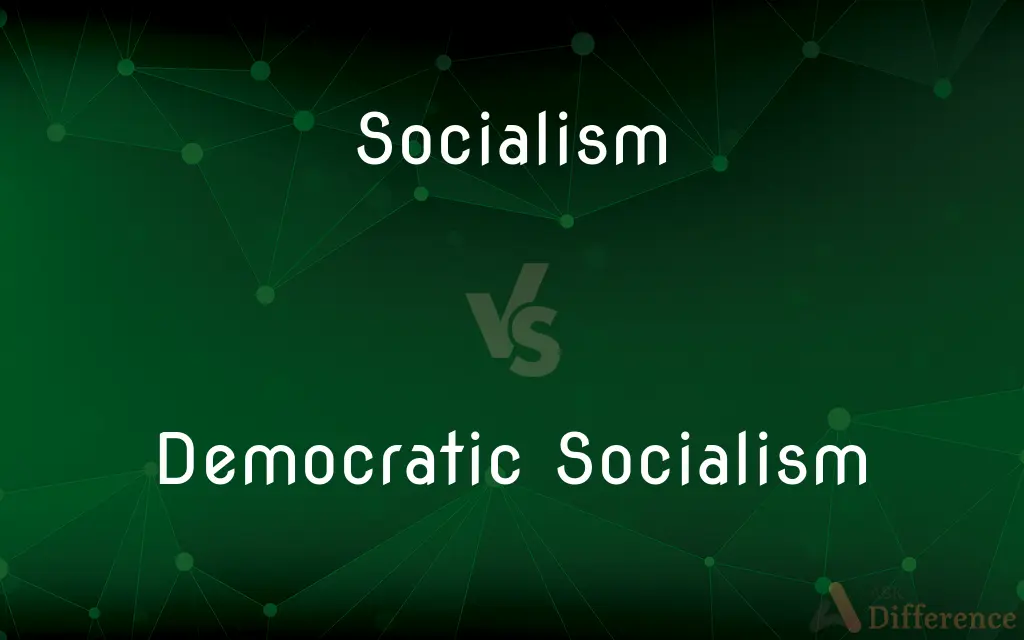Socialism vs. Democratic Socialism — What's the Difference?
By Tayyaba Rehman & Urooj Arif — Published on March 14, 2024
Socialism emphasizes collective or government ownership of production means, whereas Democratic Socialism combines socialism's economic principles with democracy's political ideals.

Difference Between Socialism and Democratic Socialism
Table of Contents
ADVERTISEMENT
Key Differences
Socialism advocates for the means of production, distribution, and exchange to be owned or regulated by the community as a whole, aiming to achieve equality and eliminate class distinctions. It often involves state control over major sectors of the economy. Democratic Socialism, on the other hand, seeks to blend socialist economic principles with a democratic political system. It supports social ownership alongside free-market capitalism, allowing for private enterprises but with significant government intervention and social welfare policies to promote social justice and reduce economic inequalities.
While socialism can manifest in various forms, including authoritarian regimes, Democratic Socialism explicitly upholds democratic governance, emphasizing the importance of political freedoms, civil rights, and public participation in decision-making processes. Socialism is broader and can encompass a range of economic and political arrangements, not all of which may prioritize democratic governance.
Economic policy in socialism typically involves planning and centralized decision-making to achieve its goals, which can lead to inefficiencies and a lack of innovation due to the absence of market competition. Democratic Socialism, however, tends to support a mixed economy that combines elements of capitalism, such as competition and private enterprise, with social welfare programs and public ownership of key industries, aiming to harness the benefits of both systems.
Socialism often faces criticism for potentially leading to government overreach and the suppression of individual freedoms, as seen in historical examples where socialist states became authoritarian. Democratic Socialism, while still advocating for significant government intervention in the economy, places a strong emphasis on maintaining democratic institutions and individual liberties, striving to avoid the pitfalls of authoritarianism.
In terms of implementation, socialism has been adopted in various countries with differing outcomes, often depending on the specific model and political context. Democratic Socialism has gained popularity in many democratic nations, particularly in Europe, where it influences public policy and social welfare systems, demonstrating its viability within a democratic framework.
ADVERTISEMENT
Comparison Chart
Ownership of Resources
Collective or state ownership
Mix of state, collective, and private ownership
Economic System
Central planning and distribution
Market economy with significant state intervention
Political System
Can vary, not inherently democratic
Democratic, with free and fair elections
Key Objectives
Eliminate class distinctions, equal distribution
Social justice, reduce inequalities within democracy
Examples
Soviet Union (historically), Cuba
Nordic countries, Bernie Sanders' policies in the US
Compare with Definitions
Socialism
Collective ownership
In socialism, factories and farms are owned by the state or the community.
Democratic Socialism
Economic democracy
Democratic socialism advocates for workers' rights and participation in business decisions.
Socialism
Central planning
Socialism often involves government making all key economic decisions.
Democratic Socialism
Social welfare
Democratic socialism supports strong social safety nets like universal healthcare and education.
Socialism
Class struggle
Socialism aims to abolish class divisions by redistributing wealth and power.
Democratic Socialism
Democratic governance
Democratic socialism combines socialist economic policies with democratic political systems.
Socialism
State role
In socialism, the state often plays a dominant role in governing and the economy.
Democratic Socialism
Mixed economy
Democratic socialism allows for private businesses but with significant government regulation.
Socialism
Equality emphasis
Socialism prioritizes equality, seeking to provide for everyone based on their needs.
Democratic Socialism
Political freedoms
Democratic socialism upholds civil liberties and political rights alongside social equity.
Socialism
Any of various theories or systems of social organization in which the means of producing and distributing goods is owned collectively or by a centralized government that often plans and controls the economy.
Socialism
The stage in Marxist-Leninist theory intermediate between capitalism and communism, in which the means of production are collectively owned but a completely classless society has not yet been achieved.
Socialism
A system of social and economic equality in which there is no private property.
Socialism
A system or condition of society in which the means of production are owned and controlled by the state.
Socialism
Any left-wing ideology, government regulations, or policies promoting a welfare state, nationalisation, etc.
Socialism
A political theory advocating state ownership of industry
Socialism
An economic system based on state ownership of capital
Common Curiosities
Is socialism the same as communism?
No, socialism and communism are different; communism is a more extreme form of socialism with no private property or class divisions.
Is democratic socialism viable in a capitalist country?
Yes, many democratic countries successfully implement socialist policies within a capitalist framework, focusing on social welfare and economic equality.
What role does the government play in a socialist economy?
In socialism, the government typically plays a central role in planning and distributing resources, often controlling key industries.
What is the main goal of socialism?
The main goal of socialism is to abolish class distinctions and ensure equal distribution of wealth and resources.
How does socialism address economic inequalities?
Socialism seeks to redistribute wealth and resources from the rich to the poor, aiming to eliminate economic inequalities and class distinctions.
Can socialism exist without democracy?
Yes, socialism can exist in non-democratic forms, as seen in some historical and current authoritarian regimes.
How do democratic socialists view private enterprises?
Democratic socialists generally accept private enterprises but advocate for regulation and policies that ensure social welfare and economic equality.
Do all socialist systems oppose private property?
Most traditional socialist systems advocate for collective ownership, but modern interpretations may allow for some level of private property within a regulated framework.
Can democratic socialism coexist with capitalism?
Yes, democratic socialism can exist within a capitalist society by incorporating socialist principles through government policies and social welfare programs.
How does democratic socialism differ from social democracy?
Democratic socialism aims for social ownership of the means of production, while social democracy focuses on reforming capitalism through social welfare policies.
How do democratic socialists fund their social programs?
Democratic socialists often propose higher taxes on the wealthy and corporations to fund social programs and infrastructure.
Does socialism always lead to authoritarianism?
Not necessarily; the outcome depends on the specific political and economic context, though there are historical examples of socialist regimes becoming authoritarian.
Are there successful examples of democratic socialism?
Yes, countries like Sweden and Denmark are often cited as successful examples of democratic socialism in practice, with strong social welfare systems and democratic governance.
What distinguishes democratic socialism from traditional socialism?
Democratic socialism emphasizes democratic governance and political freedoms, whereas traditional socialism may not prioritize democracy.
Can socialism be implemented in a capitalist society?
Elements of socialism can be implemented in a capitalist society through social welfare programs and government intervention in the economy.
Share Your Discovery

Previous Comparison
Virtual Private Gateway vs. Transit Gateway
Next Comparison
English Bulldogs vs. American BulldogsAuthor Spotlight
Written by
Tayyaba RehmanTayyaba Rehman is a distinguished writer, currently serving as a primary contributor to askdifference.com. As a researcher in semantics and etymology, Tayyaba's passion for the complexity of languages and their distinctions has found a perfect home on the platform. Tayyaba delves into the intricacies of language, distinguishing between commonly confused words and phrases, thereby providing clarity for readers worldwide.
Co-written by
Urooj ArifUrooj is a skilled content writer at Ask Difference, known for her exceptional ability to simplify complex topics into engaging and informative content. With a passion for research and a flair for clear, concise writing, she consistently delivers articles that resonate with our diverse audience.
















































